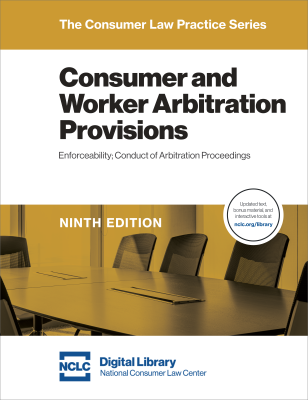In one of the most important developments for many years in the law surrounding arbitration of consumer disputes, the CFPB has proposed a rule to limit class waivers involving consumer financial products and services. On May 26, in one of the most important developments in years regarding the law surrounding arbitration of employment disputes, the Seventh Circuit ruled that the National Labor Relations Act prohibits enforcement of class waivers against employees. In Lewis v. Epic Sys. Corp., 2016 WL 3029464 (7th Cir. May 26, 2016), workers won an important victory in the fight against forced arbitration. Splitting with Fifth Circuit decisions in D.R. Horton, Inc. v. NLRB, 737 F.3d 344 (5th Cir. 2013) andMurphy Oil USA, Inc. v. N.L.R.B., 808 F.3d 1013 (5th Cir. 2015), the Seventh Circuit concluded that the National Labor Relations Act, which protects employees’ right to engage in collective, concerted activity, prohibits the enforcement of “class waivers” against employees. Writing for the court, Judge Diane Wood recognized the centrality of collective litigation to workers’ rights: “Collective, representative, and class legal remedies allow employees to band together and thereby equalize bargaining power. Given [the NLRA’s] intentionally broad sweep, there is no reason to think that Congress meant to exclude collective remedies from its compass.” Lewis, 2016 WL 3029464, at *3. The Court also rejected the employer’s contention that the FAA somehow preempts the NLRA’s protection of concerted conduct when that protection is applied to agreements to arbitrate. That argument, the Court reasoned, ignores the savings clause in Section 2 of the FAA, which provides that arbitration agreements shall be enforceable “save upon such grounds as exist in law or in equity for the revocation of any contract.” 9 U.S.C. § 2. In other words, employers cannot insulate forced waivers of concerted conduct by cloaking them in arbitration requirements and seeking the protection of the FAA:
The FAA contains a general policy favoring arbitration and a liberal federal policy favoring arbitration agreements. Its substantive command is that arbitration agreements be treated like all other contracts. Its purpose is to make arbitration agreements as enforceable as other contracts, but not more so. To immunize an arbitration agreement from judicial challenge on a traditional ground such as illegality would be to elevate it over other forms of contract—a situation inconsistent with the saving clause.
Lewis, 2016 WL 3029464, at *8 (internal quotation marks and citations omitted). Of course, the battle against forced arbitration in employment contracts is far from over. Among other roadblocks, there remains a circuit split on the issue resolved by the Seventh Circuit in Lewis. This said, it’s hard to overstate the importance of the Lewis decision to the forced arbitration landscape. For more examples (besides the National Labor Relations Act) where federal statutes limit the enforcement of arbitration clauses as against employees, see NCLC’s Consumer Arbitration Agreements § 4.3.6 (7th Ed. 2015), updated online. Importance to Consumer Arbitration Challenges Although the holding in Lewis interprets the National Labor Relations Act and not a consumer statute, the decision may prove helpful in challenging arbitration requirements applicable to certain consumer statutes as well. Judge Wood’s analysis of the conflict between the NLRA and FAA provides a framework for other situations where rights under a federal statute conflict with the Federal Arbitration Act. By way of example, consider the Magnusson-Moss Warranty Act. That statute provides that warrantors can require non-binding informal dispute resolution before formal adjudication. 15 U.S.C. § 2310(a)(3). Although the Act does not mention arbitration, the Federal Trade Commission has interpreted the statute as prohibiting forced, binding arbitration. In May 2015, notwithstanding some federal appellate court precedent declining to give the FTC’s interpretation Chevron deference, the Commission reaffirmed its “long-held view that the MMWA disfavors, and authorizes the Commission to prohibit, mandatory binding arbitration in warranties.” See NCLC’s Consumer Arbitration Agreements § 4.3.2 (7th Ed. 2015), updated online. In bolstering the FTC’s interpretation, consumer advocates can follow Lewis’s blueprint. Lewis reminds that where there is an apparent conflict between two statutes, courts should seek to harmonize them. Lewis, 2016 WL 3029464, at *6. Just as the NLRA may be reconciled with the FAA by prohibiting class waivers embedded in arbitration agreements, so too may the MMWA be reconciled with the FAA by prohibiting binding dispute resolution of warranty claims while still allowing, consistent with the MMWA’s terms, the contractual creation of efficient, and informal nonbinding arbitration forums. FTC, Final Action Concerning Review of Interpretations of Magnuson-Moss Warranty Act, July 2015, 80 FR 42710-01 (“Like the statutory text, the Commission's rules encourage arbitration proceedings when they comply with IDSM procedural safeguards and are not both mandatory and binding.”). Similar conflicts can arise when consumers seek to raise claims in a bankruptcy proceeding (Id. § 4.3.3), or when an arbitration agreement limits remedies provided by federal statute (Id. § 4.4). While there is already excellent precedent in these areas to challenge an arbitration agreement, Lewis provides another important and also very recent and thoughtful precedent.


